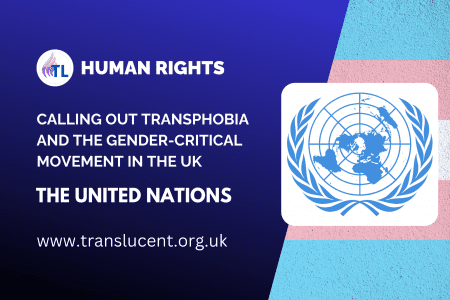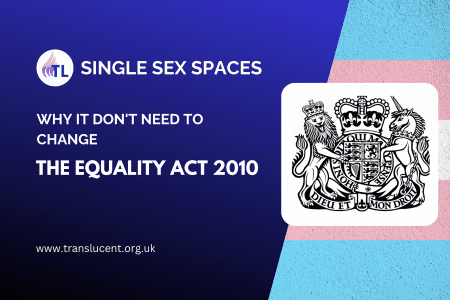Trans people invariably suffer gender incongruence, previously known as gender dysphoria. Trans people are not mentally ill, but mental illness is widespread in the trans community because of online hate, massive ongoing trans-hostile press coverage and incredibly long waits at Gender Identity Clinics, often running close to a decade.
Trans people describe gender incongruence as desperation, wrongness, jealousy, loathing, sadness, disgust, hopelessness, self-hate, drowning and, even more disturbingly, rejection, homelessness and suicide.
Taking one’s own life is an act of desperation – leaving family and friends in shock and often wondering if they could have done more. Statistics vary, but the Williams Institute in the US state that 40% of trans people consider suicide, and many go on to take their own lives.
There are a number of factors that contribute to the high rate of suicide consideration among transgender people, including:
- Discrimination: Transgender people face discrimination in many areas of their lives, including housing, employment, and healthcare. This discrimination can lead to feelings of isolation, hopelessness, and despair.
- Violence: Transgender people are also more likely to experience violence than the general population. This violence can be physical, sexual, or emotional. It can lead to post-traumatic stress disorder (PTSD) and other mental health problems, which can increase the risk of suicide.
- Rejection from family and friends: Transgender people may also face rejection from their family and friends. This rejection can be very painful and can lead to feelings of loneliness and isolation.
- Stigma: Transgender people face stigma from society at large. This stigma can make it difficult for them to get the support they need, and it can also lead to feelings of shame and worthlessness.
TERF is an acronym for “trans-exclusionary radical feminist”. It is a term used to describe feminists who believe that transgender women are not women and that they should not be included in feminist spaces or movements. TERFs often argue that transgender women are men who are trying to invade women’s spaces and that they pose a threat to cis women. They may also use transphobic language and stereotypes to justify their views.
TERF ideology is based on the belief that sex is a binary and that there are only two genders, male and female. TERFs believe that transgender women are not women because they were not assigned female at birth. They also believe that transgender women’s experiences are not the same as cis women’s experiences and that they should not be included in feminist movements.
TERF ideology is harmful to transgender people. It can lead to discrimination, violence, and even death. TERFs often use their platform to spread misinformation about transgender people and to incite hatred against them. They may also deny transgender people access to healthcare, housing, and employment.
“Terfing” is when a TERF participates in activities to spread its ideology.
If you see someone engaging in terfing, it is essential to speak up. You can challenge their views, educate them about transgender issues, or call them out on their behaviour. It is also essential to support transgender people and to stand up for their rights.
TERFS likes to boast about “terfing” – and in this video which was shared on YouTube, we see two women who believe terfing is “fun”.
They make specific reference to India Willoughby, a trans woman who was the world’s first transgender news reader. The acronym TRA relates to “Trans Rights Activists.”
We will leave you to decide if this behaviour is acceptable.
“We’ve been ‘TERFing’ and it’s been such fun”
It’s clear that for many ‘gender critical’ transphobes, being a transphobic bigot is just a recreational activity! 😣
These heartless transphobes clearly have no life outside of their obsessive bigoted campaigning! pic.twitter.com/2GQ2X6mZrC
— Helen🏳️⚧️✊🏻💕 (@mimmymum) August 6, 2023
People who consider themselves as terfs may include J K Rowling, Maya Forstater, Helen Joyce, Kathleen Stock, Julie Bindel, Andrew Neil, and many more.











 To provide the best experiences, we use technologies like cookies to store and/or access device information. Consenting to these technologies will allow us to process data such as browsing behaviour or unique IDs on this site. Not consenting or withdrawing consent, may adversely affect certain features and functions.
To provide the best experiences, we use technologies like cookies to store and/or access device information. Consenting to these technologies will allow us to process data such as browsing behaviour or unique IDs on this site. Not consenting or withdrawing consent, may adversely affect certain features and functions.